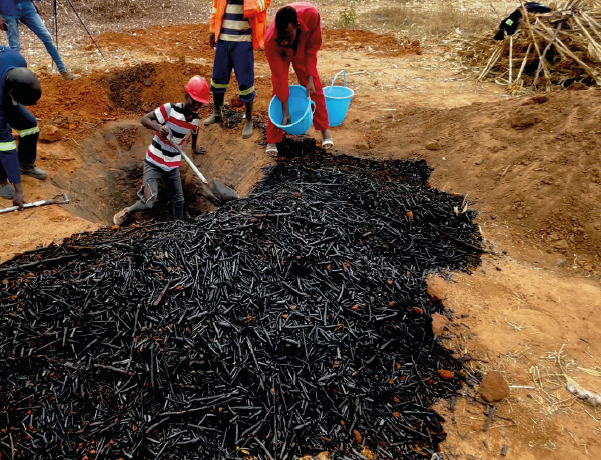ICAC promotes and pioneers ‘Cone-Pit Open Earth Kiln Technique’ for mass-scale production of biochar in Asia and Africa.
Small holder farmers in less-developed countries can’t afford to grow cotton just for its fiber. While the fibre is the most well-known and valuable part of the cotton plant, growers in Africa must utilize as much of the cotton plant as possible to maximize their income.
Over the past two years, ICAC scientists have conducted several practical training programs on the ‘cone-pit open earth kiln,’ a simple, low-cost technique to produce biochar from cotton stalks and other farm residues. After initial training sessions in Zambia, Cameroon, Burkina Faso and other countries, the technique is now being used by hundreds of farmers across Africa — and the momentum continues to build.
It is now being taught and promoted in Bangladesh by Cotton Connect; in Zambia by Cotton Development Trust (CDT) and Solidaridad; in Côte d’Ivoire by Olam Agri and Ivoire Coton; in Cameroon by Sodecoton; and in India by multiple organizations.

The most recent training session was held in Yamoussoukro, Côte d’Ivoire, in April 2023. ICAC Chief Scientist Dr Keshav Kranthi and the Project Consultant for the ITC-EU-CDT-ICAC project, Dr Sandhya Kranthi, conducted practical training at the l’Institut National Polytechnique Félix Houphouët-Boigny de Yamoussoukro (ESA INP-HB) for its own staff and participants from Olam Agri and Ivoire Coton. They also held training sessions in Kushtia, Bangladesh, for the staff of Cotton Connect, Primark, and the Cotton Development Board, in addition to multiple ginners.
According to preliminary results from ICAC initiatives, biochar produced from cotton stalks is highly alkaline and can effectively remediate acidic soils, improve soil structure, enhance cation exchange capacity, and enrich soil health by adding organic carbon. Although acidic soils can benefit directly from alkaline biochar, the addition of organic matter and manure can further assist in enhancing soil health without the risk of nutrient lockup caused by biochar. In addition to promoting the use of alkaline biochar, the ICAC is also encouraging the adoption of technologies to produce high-quality, nitrogen-rich compost. This can be achieved through aerated matrices using biochar or through an anaerobic process called ‘bokashi,’, which can produce acidic compost from organic matter within 2-3 weeks and neutralize alkaline biochar, resulting in the quickest possible enrichment of soil organic matter.
Dr Keshav Kranthi and Dr Sandhya Kranthi standardized the cone-pit open earth kiln technique for producing biochar from cotton stalks after being inspired by the ground-breaking research paper, ‘Kon-Tiki flame curtain pyrolysis for the democratization of biochar production’, authored by Schmidt and Taylor (The Biochar Journal, 2014). This technique was used in the project, ‘Doubling small-farmer yields in Zambia’, which was funded by the International Trade Centre (ITC) and the European Union (EU) and implemented by CDT and the Cotton Board of Zambia (CBZ) in Zambia. Mr Martin Simasiku, Mr Lwisya Silwimba, Mr Derrick Sichilima, Mr Dafulin Kaonga, and Mr Sunduzwayo Banda provided leadership for the initiative in Zambia.
The ICAC has recently initiated a project called ‘Adapting Innovations for Resilience to Climate Change for Smallholder Cotton Farmers (i4Ag-AIRCoA)’ carried out by ICAC and CIRAD on behalf of Deutsche Gesellschaft für Internationale Zusammenarbeit (GIZ) GmbH through the Innovation for Agriculture (i4Ag) Program. It has been funded and commissioned by the German Federal Ministry for Economic Cooperation and Development (BMZ) to produce biochar and use it in regenerative agriculture to enhance yields in at least 4,800 one-acre demonstration fields in Cameroon and Cote d’Ivoire from December 2022 to December 2025. The project aims to promote the use of biochar as a sustainable soil amendment and carbon sequestration tool while enhancing smallholder cotton farmers’ resilience to climate change.